The Bliss OS x86 is another Android-based operating system. You can say it is a fork of Android x86 project which is open-source and free to use. The custom Android Bliss OS is not only available for X86 PC or laptops but also other x86-based devices can be used for its installation including smartphones and Tablets. If you are familiar with the process- of how to flash a smartphone then now you know the Bliss OS is here. It supports both 32-bit and 64-bit devices.
The builds of Bliss OS are also compatible with Chromebooks and MacBooks running on Intel or AMD CPUs. For gaming, the Octopus has included a keymapping solution developed by the Phoenix OS team (another Android OS).
In this tutorial, we show you how to install Bliss OS X86_X64 on a PC as well as VirtualBox.
Bliss OS Minumum System hardware requirements
- X86 processor
- 1 GB hard disk
- Minimum 512 RAM and 2 Gb is recommended
Download Bliss ISO Image
- To install this Android OS on a PC, first of all, we will download the Bliss OS x86_x64 bootable ISO file.
- Go to the blissroms.org download section
- When you visit the Bliss OS download repository you will find different folders such as Bleeding_edge, Nightly, Stable, and Udoo.
- Select and Open the Bleeding Edge folder.
- You will find multiple releases of the Bliss OS – both stable and beta.
- Download the latest stable ISO file version of the OS. Android 13 is available on it.
- For example, in our case, it was: Bliss-v16.9.4-x86_64-OFFICIAL-gapps-20240220.iso
- After downloading the Bliss ISO file, go to the next section of creating a bootable pen drive.
Create Bliss x86_X64 bootable USB drive
- Once the ISO file of Bliss OS is downloaded on your machine it’s time to create a bootable USB drive.
- For that, first, download the Rufus Bootable USB software. Here is the link.
- Insert the Pen drive into a system that you want to make bootable.
- Click on the Rufus setup and run it. This bootable USB maker is a portable software and doesn’t need installation.
- When it opens, select the Pen drive from the Device section.
- Then click on the SELECT button and select the above downloaded Bliss ISO image.
- Finally, click on the START button, and the process of making a Bliss OS bootable pen drive will start.
- You get a pop-up, ignore it, and press the OK button.
- It will again warn you that all data on the Pen drive will be erased, so make sure nothing is important on the USB drive. Then click on the OK button.
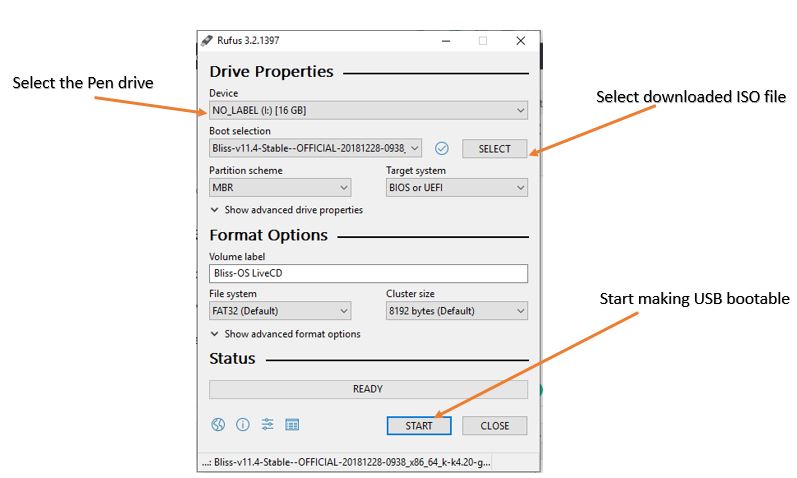
Install Bliss OS on a PC or Virtual Machine
After creating the Bootable pen drive, insert it into the PC system where you want to install the Bliss OS.
Step 1: Boot your system with Bliss OS USB drive
If your system’s first boot order is already set to Removable media then the OS will automatically boot. Otherwise first set the boot order. OR use any of these – F2, F8, F12, or Esc according to your system BIOS to select the booting medium or device.
Step 2: Select- Install Bliss-OS to the hard disk
As the first screen of booting appears, select the Installation- Install Bliss-OS to hard disk option.

Step 4: Create/Modify partitions
Use the Tab key and then arrow keys to select the Create/Modify partitions and hit the Enter key.

Step 3: Create a New Partition
Here you will see the disk drive and its space in MB available in your same for both PC and Virtual machine. Select the New option using the arrow keys and press the Enter button.
Enter the amount of space you want to allocate to the BlissOS, whereas to use the whole space leave the current settings and just press Enter.

Step 7: Write the changes to prepare a disk for Bliss installation
After the above step, we need to write out alterations to the drive. Select the Write option for that and press the Return/Enter key again.

For implementing the changes, it will ask for your permission. Type yes

Once the above step process is done, it’s time to quit the partition table creation tool. Use the Quit option.

Step 8: Install the Bliss OS
As soon as you quit you will again see the Choose Partition section, where you will find a partition to install the OS. Select that and press the OK button.

It will ask to create a GPT, just select YES.
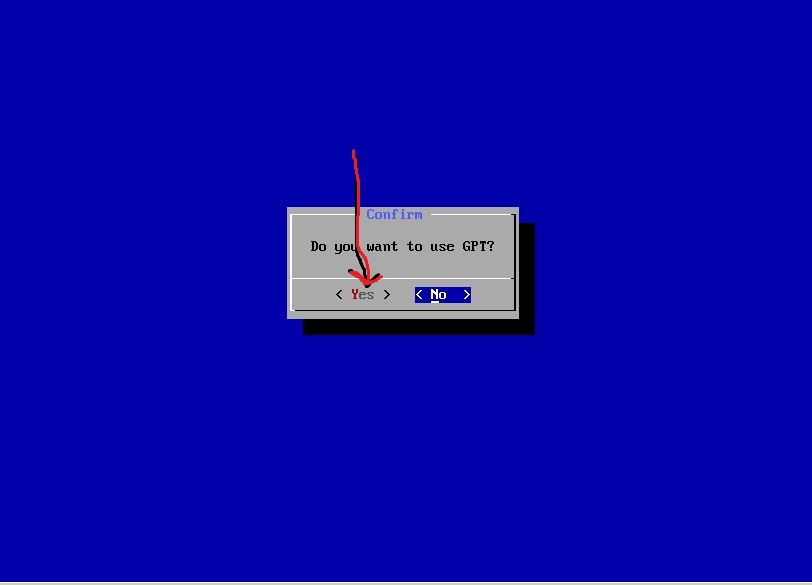
Format the drive using ext4 or any other filesystem format you want.
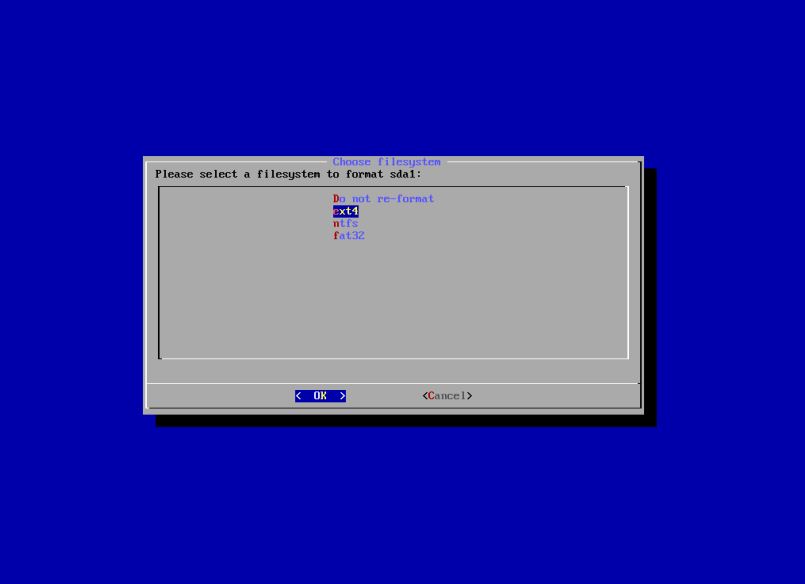
Select the Yes option.
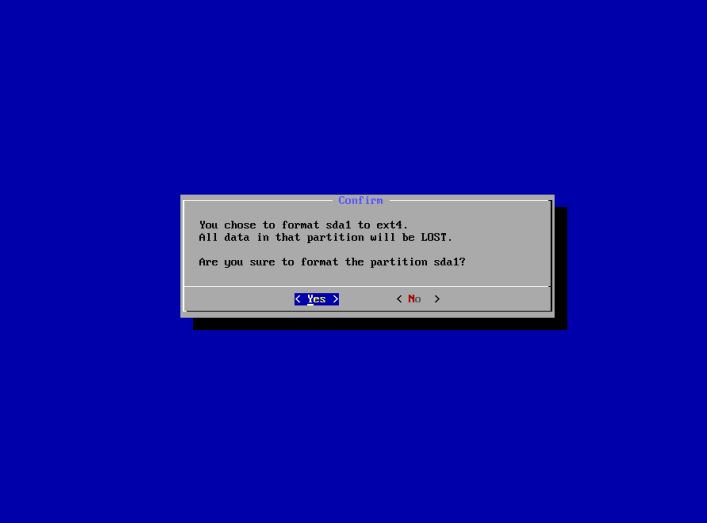


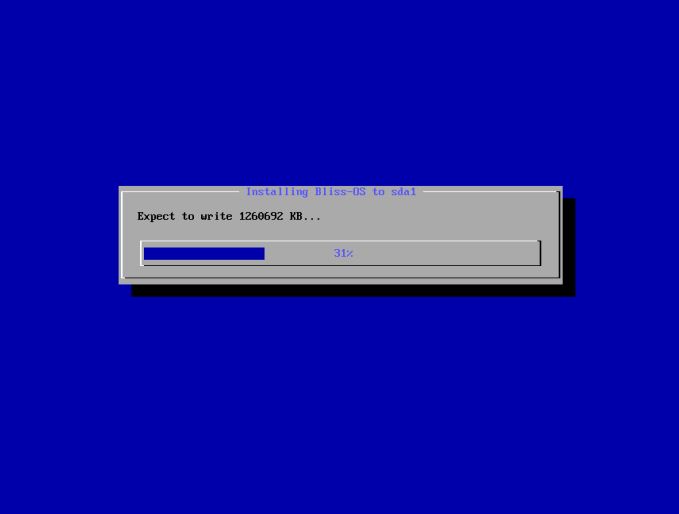
Step 9: Reboot the PC or Virtual Machine
Once done Remove the Pen Drive and Select the Reboot option and you will get the Bliss OS installed on your system.
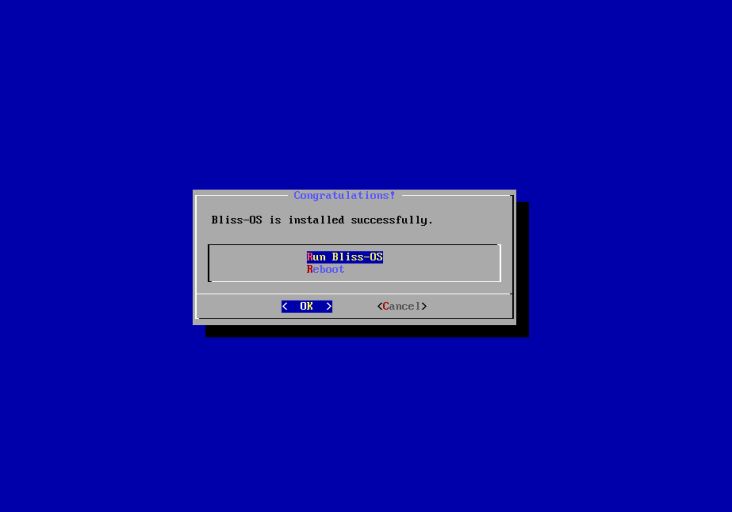
You will have a running Bliss OS to set up for usage on a PC or Virtual Machine. However, if you don’t know how to create a virtual machine then can check out the tutorial further.

Bliss OS Virtual Machine installation
We tried the installation of Bliss OS on VirtualBox but unfortunately unable to start it. However, BlissOs works perfectly in the VMware Workstation player…
In Vmware Workstation:
- Click on the “Create a New Virtual Machine” option.
- Select “Install disc Image file (ISO)” and then click on the Browse button to select the BlissOS ISO image you have downloaded.
- Select the Guest Operating system version as – Other 64-bit.

- Give some name to your Virtual Machine such as “Bliss OS” and leave the Location path as it is.
- Set the Virtual Disk size to around 20 GB and click on the Next button.
- To set the RAM, click on the “Customize Hardware” button.
- Use the slider and assign at least 2GB of RAM or more as per your requirements.
- After that start the created Virtual machine and follow the Bliss OS installation steps we already have discussed previously while installing it on a PC.

For VirtualBox Installation:
Although the whole process of installation is similar for Virtualbox Virtual machines too, just the beginning will be a little bit different.
- Open the VirtualBox.
- Click on the New option given on the menu.
- Give some name to your virtual machine such as here we are using “BlissOS”.
- Click on the “ISO Image” drop-down box and select the “Others...” option, after that, navigate to the downloaded Bliss ISO image and select that.
- Select Type- Other and version Other /Unkown 64-bit.

- Assign the RAM, 2GB would be good but I recommend up to 4GB for better performance. Whereas, set the CPU to two or more cores…

- Select Create a virtual disk now and assign around 20GB or more of space, if you want to install apps or games from the Play store.

- Click on the Finish button and then Start the Virtual machine. The rest of the procedure will be the same as mentioned for the PC installation.

- Once the installation has been done on the Virtual Machine. The OS will ask to reboot, then first remove the inserted ISO disk from Virtualbox by right-clicking on the CD icon given on the right bottom side.
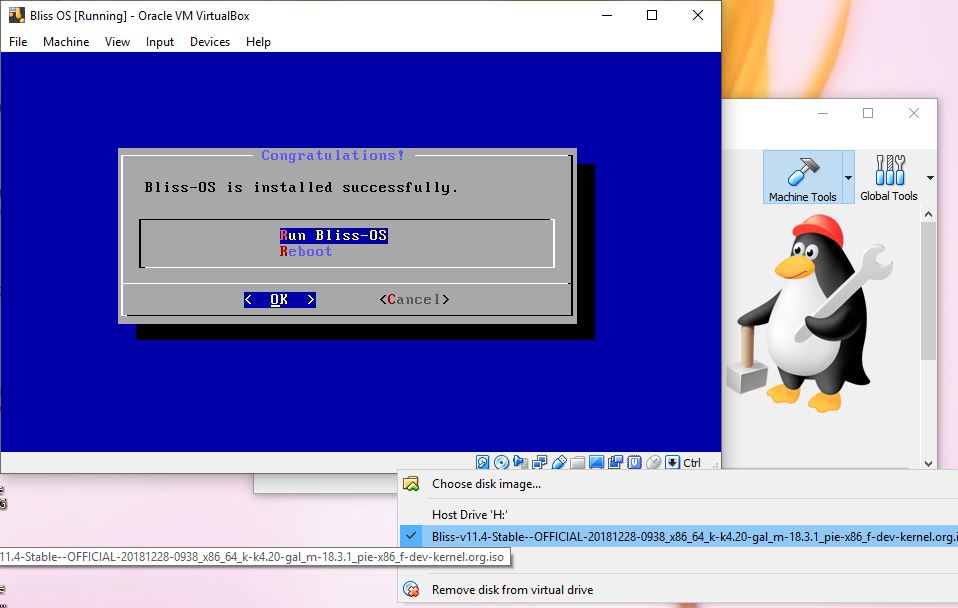
Other Useful Tutorials
- Best Android OS for PC
- How to download & install Openthos Android OS on a PC using bootable USB
- How to delete or unpartitioned USB drive partitions on Windows 10/8/7?
- How to download & install Cloudready Chromium OS on VirtualMachine
Let us know your thoughts and the difficulties you found with the Bliss OS during your usage.

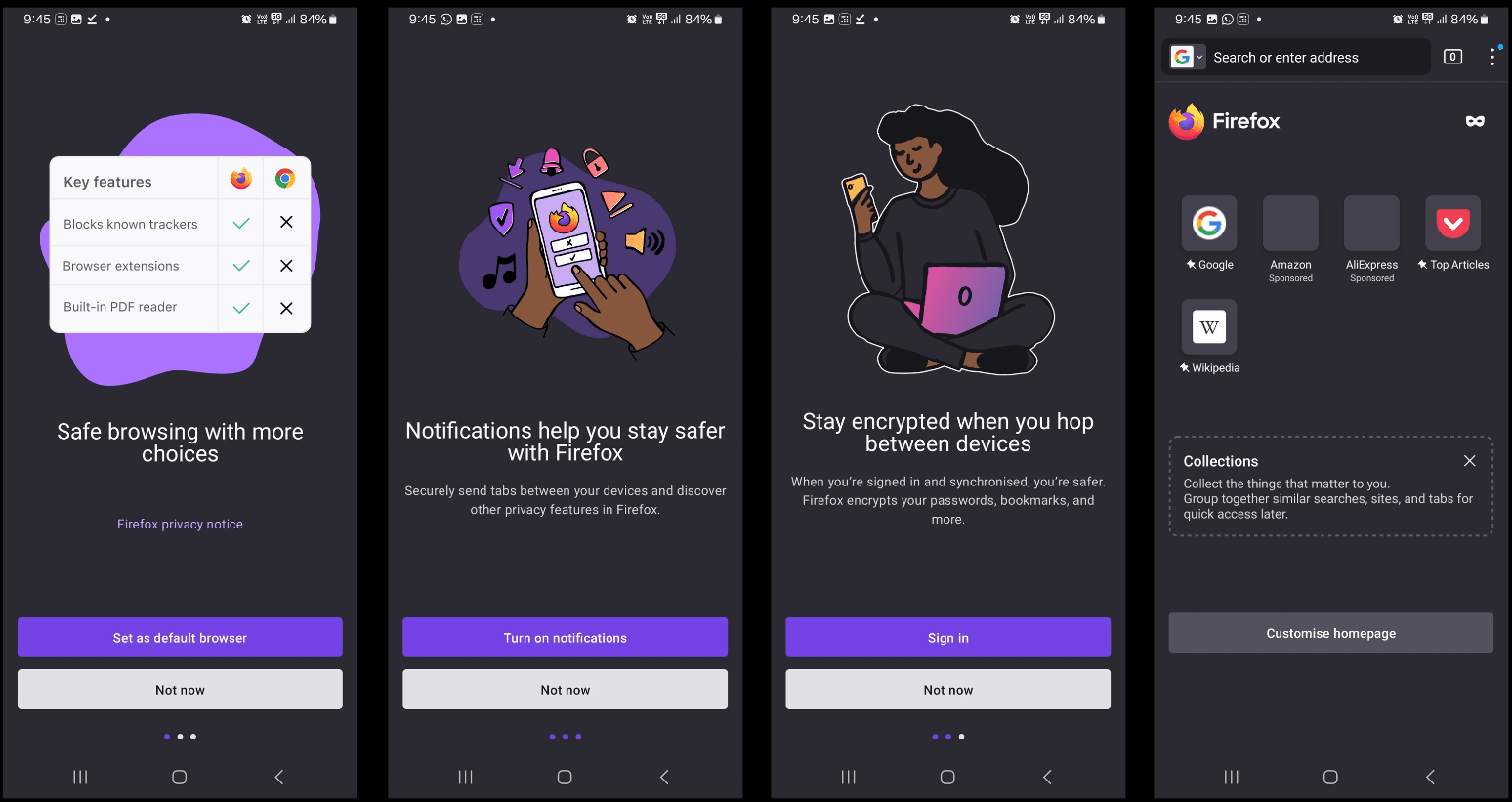





after installed blis os and remove the optical drive in vbox then after the start it shows fatal error no bootable medium error occured.
I have the same issue, “no bootable medium” on Virtualbox 6, Win Pro with VT-x activated in BIOS and Virtualbox (not in windows though)
I am having the same outcome “FATAL: No bootable medium found! System halted.” Using virtualbox on linux mint 19 on a thinkpad.
Bliss yantra (Android Q) stuck in detecting android x86 (Virtual Box)
thanks
i got a problem with the cpu
“Just do this, so easy even everybody can do it”. Riight. Another how-to step by step guide where the options in the screencaptures differ.
There is no [ Bootable ] option in that disk partition thing. It didn’t ask about GPT, but GRUB. It did ask about GPT at earlier attemps, still no go. If we have to use GPT, why ask?
And what’s this mess about making a “pen drive” (USB), when it’s on VirtualBox? Just use the damn iso?
No bootable medium. Ofc.
It just fails to install grub. every time.
Don’t buy and use Android devices app coz there is a huge mess with hardware support as native as emulated ones ! Even original Android devices doesn’t support OS upgrade even if its powerful enough coz hardware vendors soon drop support in favor new hardware that simply costs way too much to get soon obsolete also ! I have not found any hardware that support Android OS upgrade to latest Android version – *.apk to *.xapk doesn’t work on all Android devices. How many Smart phones, tablets and other devices are obsolete due dropped support ? On PC this will newer work properly coz Android kernel is developed for ARM CPU’s has to be emulated on x86_64 and AMD and nVidia GPU’s very problematic. Waydroid (native Android app run) Linux needs X11 Wayland and Linux Zen Kernel and apparently works only on Intel based GPU’s any other are problematic – leads to fault installation/operation. May be Win 11 integrated support for native run Android app will MS do properly, they have necessarily competent man power to do so. I do not advertise MS here, but open source is way to dispersed and doesn’t cover necessarily hardware/software to work properly. I do need to run damn Android app in native mode but after month of testing this doesn’t work at all in all cases nor Android PC solutions nor on Linux alike ! Those who post such howto’s should refer to exact hardware used otherwise this is waste of nerves electricity and time invested in such useless doing !
Also keep in mind that CPU has to support SSE 4.2. Some older AMD models use SSE 4a instead.
What I did, Bliss OS cannot be started and crashes and restarts.